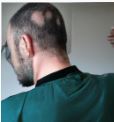Alopecia Areata: A Brief Guide to Understanding the Mysterious Hair Loss Condition
Alopecia Areata, often simply referred to as alopecia, is a perplexing and somewhat enigmatic condition that affects millions of people worldwide. It’s a condition that can strike at any age and can be disheartening and challenging for those who experience it. We will exploring the world of Alopecia Areata, what it is, its causes, symptoms, and potential treatments.
What Is Alopecia Areata?
Alopecia Areata is an autoimmune disorder that causes hair loss in distinct, often small, round patches on the scalp and other parts of the body. This hair loss occurs when the immune system mistakenly targets hair follicles, leading to the disruption of normal hair growth.
The condition can manifest in various ways, ranging from minor hair loss to complete loss of all body hair, including eyebrows and eyelashes. The severity and progression of Alopecia Areata can vary from person to person, making it a unique and unpredictable condition.
Causes of Alopecia Areata
The exact cause of Alopecia Areata remains a subject of ongoing research, and there is no one definitive answer. However, it is widely believed to be an autoimmune disorder, which means the body’s immune system mistakenly identifies hair follicles as foreign invaders and attacks them. Genetic factors also play a role, as individuals with a family history of the condition are at a higher risk of developing it.
Stress and environmental factors may trigger or exacerbate Alopecia Areata, but they are not considered direct causes. The precise interplay of these factors remains a subject of study.
Symptoms of Alopecia Areata
The most common symptom of Alopecia Areata is the appearance of one or more round, hairless patches on the scalp or other areas with hair. These patches can vary in size and often have a distinct border between the affected area and healthy hair.
In some cases, the condition may progress, leading to more extensive hair loss, and in rare instances, it can result in the loss of all body hair, a condition known as Alopecia Universalis.
Aside from the physical symptoms, many individuals with Alopecia Areata may also experience emotional and psychological effects, such as a loss of self-esteem, anxiety, or depression, due to the noticeable change in their appearance.
Treatments and Management
While there is no cure for Alopecia Areata, there are various treatments and management strategies available to help those affected by the condition:
- Topical Treatments: These include corticosteroid creams or ointments, which can be applied to the affected areas to reduce inflammation and promote hair regrowth.
- Injections: Intralesional corticosteroid injections are administered directly into the bald patches to stimulate hair regrowth.
- Topical Immunotherapy: This involves applying irritants to the affected areas to trigger an allergic reaction, which can help stimulate hair regrowth.
- Oral Medications: In some cases, oral medications, such as corticosteroids or immunosuppressants, may be prescribed to help control the autoimmune response.
- Wigs and Hairpieces: Many individuals with Alopecia Areata turn to wigs, hairpieces, or scarves to manage the visible effects of hair loss.
- Counselling and Support: Emotional and psychological support is crucial in coping with the impact of hair loss. Support groups and counselling can help individuals deal with the emotional aspects of Alopecia Areata.
- Alternative Therapies: Some people explore alternative therapies like acupuncture or herbal remedies to manage their condition, though their effectiveness varies. If you want to explore the alternative natural remedies, which have been proven to work, please Contact Us to explain the procedure. Usually is one natural application on the effected area, but if the alopecia is complete loss of all body hair, including eyebrows and eyelashes it will take several applications.
Conclusion
Alopecia Areata is a complex condition that affects people in various ways. While it can be emotionally challenging, there are treatments and support available to help those with this condition lead fulfilling lives. If you or someone you know is experiencing hair loss, it’s essential to consult a medical professional who can provide guidance and develop a personalized treatment plan.
Remember that you are not alone in this journey. Alopecia Areata may be a mysterious and unpredictable condition, but with the right information, support, and resources, individuals can find ways to manage it and lead fulfilling lives.


